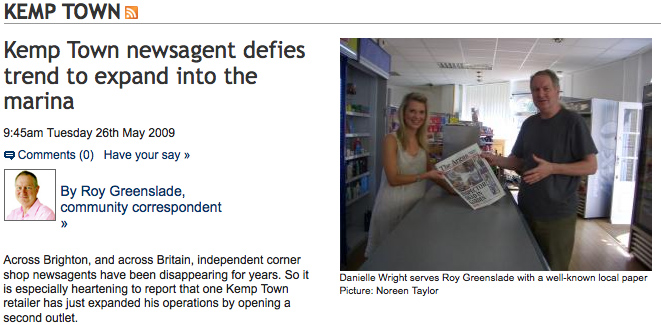Since I started using Twitter I’ve always been amazed (and grateful) at how quickly calls for technological help and assistance with ideas and projects are answered. It’s one of the main reasons I’m a fan of Twitter.
There are plenty of media/journalist Twitter databases out there, but below are the beginnings of a list of digital editors on Twitter.
What do I mean by digital editor? In this instance, a journalist working primarily online, on web projects or co-ordinating multimedia output. The web editor of a newspaper site or magazine site, for example. It’s in no particular order, except for being divided by ‘traditional’ industry sectors at the moment, but if this isn’t useful, just let us know – would be great to get more international representatives too.
But the criteria for inclusion on the list are intentionally loose – this is aimed at networking, problem-solving and idea sharing between journalists working in the same space and similar roles. (Feel free to nominate any additions or drop us a tweet @journalismnews)
UPDATE April 16 – please read blog post two on how to message the group via Twitter
Newspapers
Alison Gow (@alisongow) – executive editor, digital, Liverpool Daily Post & Liverpool Echo
Kevin Matthews (@kmatt) – head of web and data, Liverpool Daily Post
Neil MacDonald (@xxnapoleonsolo) – deputy head of web and data, Liverpool Daily Post
Jo Wadsworth (@jowadsworth) – web editor, Brighton Argus
Tom Pegg (@tomatthechad) – digital content manager, Mansfield Chad
James Goffin (@jamesgoffin) – regional web producer, Archant
Sarah Booker (@sarah_booker) – web editor, Worthing Herald
Gustav Svensson (@gustavsvensson) – web editor, entertainment and arts, Sydsvenskan.se
Stephen Emerson (@stephen_emerson) – deputy online editor, Scotsman.com
Sam Shepherd (@SamShepherd) – online journalist, Bournemouth Daily Echo
Joanna Geary (@timesjoanna) – web development editor, business, Times Online
Sarah Hartley (@foodiesarah) – head of online editorial, MEN Media
Iain Hepburn (@iainmhepburn) – online editor, DailyRecord.co.uk
Lucia Adams (@luciatimes) – web development editor, Times Online
Carmen Boles (@carmenb) – online news editor, Gazette.com
Marcus Warren (@MarcusWa) – editor, Telegraph.co.uk
Dan Owen (@danowen) – executive editor online, Trinity Mirror
Steve Nicholls (@steve_nicholls) – multimedia editor, Birmingham Post
Anna Jeys (@ajeys) – multimedia editor, Birmingham Mail
Steve Wollaston (@stevewollaston) – multimedia editor, BPM Media and Sunday Mercury
Julie Martin (@jules_27) – Teesside Evening Gazette
Helen Dalby (@helendalby) – regional multimedia manager, NCJ Media
Nick Turner (@nickincumbria) – head of digital content, CN Group
Christian Dunn (@christiandunn) – digital news editor, NWN Media
Hugh Dixon (@hugh_d) – web editor and production editor, thisisbath/Bath Chronicle
Paul Cockerton (@paulcockerton) – web editor, Lancashire Telegraph
Dan Owens (@hornetdan1979) – deputy news editor, Northampton Chronicle and Echo
Dan Kerins (@dankerins) – web journalist, Southern Daily Echo
Broadcast
Marsha Graham (@marshagoldcoast) – multimedia manager for 102.9FM Hot Tomato, Australia
Rob Winder (@robwinder) – news editor, Al Jazeera website, Washington DC
Tom Thorogood (@TomThorogood) – digital news editor, MTV
Magazines
Martin Stabe (@martinstabe) – online editor, Retail Week
Victoria Thompson (@VicThompson) – assistant online editor, Nursing Times
Neil Durham (@NeilDurham) – deputy editor, GP and Independent Nurse
John Robinson (@PulseToday) – digital content manager, Pulse Today
Peter Houston (@p_houston) – editorial director for Advanstar Communications, Europe
Alex Smith (@alexsmith68) – web editor, Building.co.uk
Keira Daley (@daleyrant) – web editor, Australian print magazine
Lara McNamee (@lovelylara33) – assistant intelligence editor, ICIS
Gabriel Fleming (@gabefleming) – online editor, Nursing Times
Janie Stamford (@janiestamford) – contract catering editor, Caterer & Hotelkeeper
Robin Latchem (@lgcplus) – online editor, Local Government Chronicle
Keely Stocker (@keelystocker) – digital content manager, Drapers Online
Scott Matthewman (@scottm) – assistant manager, The Stage
Specialist website
Michael Hubbard (@michaelomh) – founder and music editor, MusicOmh
Krystal Sim (@krystalsim) – web editor for sustainability magazine BSD – bsdlive.co.uk
Arun Marsh (@ArunMarsh) – content producer/editor, Local Gov
Rick Waghorn (@MrRickWaghorn) – publisher, MyFootbalWriter
Emma Waddingham (@emmawad) online editor, Legal-Medical.co.uk
Michael McCarthy (@HealthGuide) online editor, LocalHealthGuide
Steve Gooding (@rmtimestech)- Romney Marsh Times
Manoj Solanki (@ManojSolanki) – SeekBroadband.com
Graham Holliday (@noodlepie) – digital editor, Frontline Club
Craig McGinty (@craigmcginty) – publisher, ThisFrenchLife
Mark Crail (@markcrail) – managing editor, XpertHR
Freelance
Adam Oxford (@adamoxford)
Rachel Colling (@rachcolling)
Ashanti Omkar (@ashantiomkar)

